You’ve heard me talk about how magical these Fear of Singing Breakthrough Workshops are, but you still may not understand quite what happens when you attend. Although I always customize each workshop around whoever is in the room — their strengths, challenges, goals, etc., there are elements and activities that I include at almost every workshop:
Use of Toning / Drone notes
What does this mean? It’s very simple really…
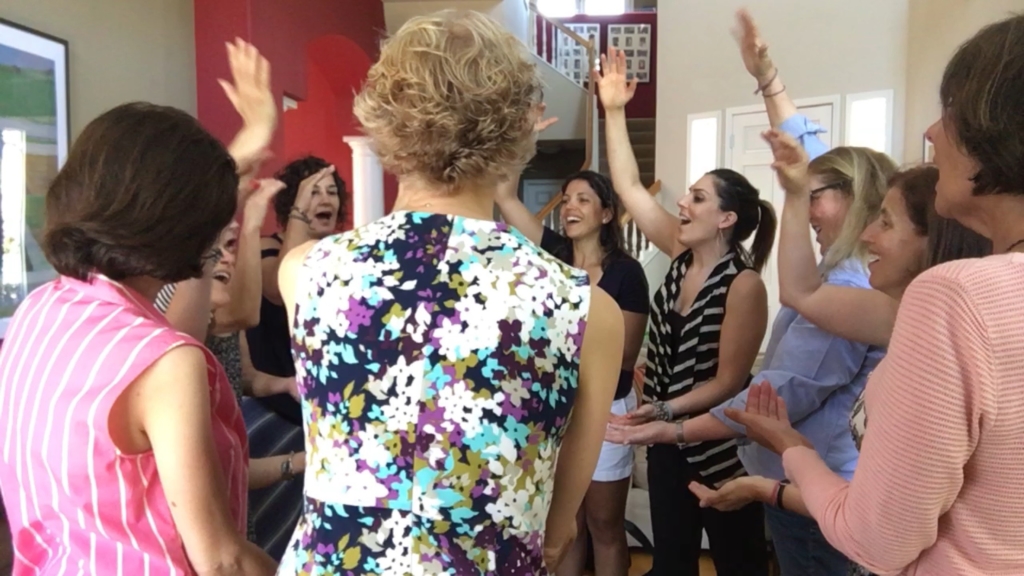 When you sing one long, held note, that is called a drone note. This is something that everyone can do, but of which few people understand the significance. One of the first things we do is explore the magic of singing a drone note together. Sometimes we each hold our own separate notes, creating a new, unexpected sound experience each time; sometimes we all sing the same note together; and sometimes I direct the group to sing different notes that are in harmony with each other. I also go around the room and use drone notes with each person, one at a time — an eye and ear-opening experience!
When you sing one long, held note, that is called a drone note. This is something that everyone can do, but of which few people understand the significance. One of the first things we do is explore the magic of singing a drone note together. Sometimes we each hold our own separate notes, creating a new, unexpected sound experience each time; sometimes we all sing the same note together; and sometimes I direct the group to sing different notes that are in harmony with each other. I also go around the room and use drone notes with each person, one at a time — an eye and ear-opening experience!
This activity gives everyone a visceral experiences of dissonance, unison, and harmony. If you don’t know what these words mean, you will understand them not only in your head, but in your body, once you have taken this workshop. Being able to hear and feel this is a foundational skill for singing, and also super fun and powerful — it can get you a little high!
Singing drone notes together is an amazing fear-buster. There is something about the sound/feeling/vibration of the combining of human voices that brings out our humanity. Fears melt away and we instantly feel more trust in ourselves and each other. Magic.
Learning to Match Pitch (or sing in tune)
Using drone notes is a perfect way to start learning how to match pitch, or sing “in tune.”
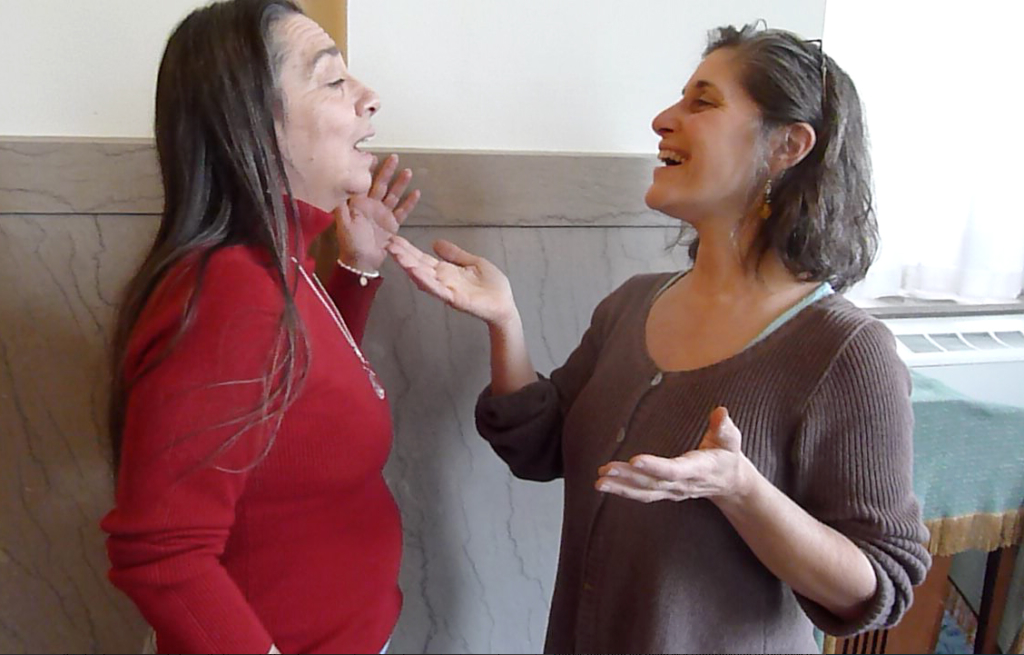 By singing a with a drone note and then moving your voice away from it and then back to that original note, you are learning to recognize the sound and feeling of being in tune.
By singing a with a drone note and then moving your voice away from it and then back to that original note, you are learning to recognize the sound and feeling of being in tune.
For people who have asked for feedback when we’re singing songs I might give individual coaching on nailing the notes in a song (for example: “You’re just a tiny bit low, up, up, up, THAT’S IT — YAY!). When we’re all singing together in a group, I may also coach on pitch, or I might say, “Let’s not worry about fine tuning this one, let’s just focus on singing out, making eye contact, and expressing emotion,” or something along those lines.
Singing Lots of Songs
I like to include a wide variety of songs… 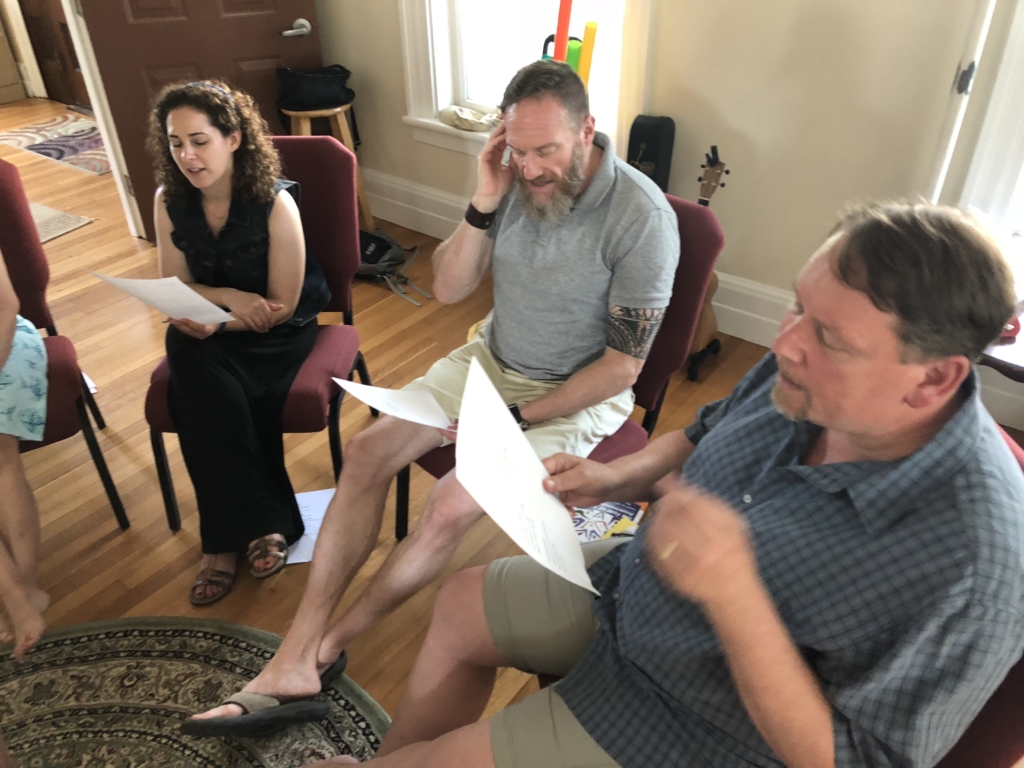
I want you to sing songs that are familiar to you already, and songs from other cultures that evoke less familiar places and times.
I bring tons of song lyric sheets to each workshop for people to choose from, and I always have a few songs tucked away in my head (and folder) to pull out when the time is just right. Choosing the right song for the moment is a great way of keeping people engaged, addressing the goals of the people in the room, and making sure that we’ve got good energy — this is part of why time flies at these workshops!
Sharing our “Singing Stories” and Goals
This is important because we are so vulnerable when it comes to singing.
People who think they can’t sing, or who feel stuck or inhibited about their voice, often feel alone. If someone told you to “just mouth the words” in 4th grade chorus, chances are you remember that moment very vividly, and can still feel the shame associated with it. Our culture is not kind to people who need support with their singing — people are usually discouraged. So when we share our stories, it becomes clear right away that you are not alone! You are in good company, and we are here to support one another. We bond as a group very quickly — you’ll be amazed!
When you share your stories and goals with the group, it also gives me a view into where you’re coming from and an understanding of where you want to go, so that I can help you to get there.
Basic Music Theory, and How to Approach a Song
Usually there are a few people at each workshop who already have a basic, working understanding of music theory, but many non-singers have no idea what words like, “octave,” “scale,” “key,” “sharp,” and “flat,” mean, and this can add to their anxiety. Understanding the ideas of basic music theory as it applies to singing can be very comforting and helpful.
I usually bring out my little keyboard so we have not only sound, but also visuals, to help people understand. And understanding can help you when it comes to learning songs and singing in tune. It’s really cool, and easier than you might think.
Moving Around, Make Crazy Noises and Rhythm
We don’t just sit in chairs and sing.
Sometimes we get up and stretch, make crazy noises, walk around the room while singing, or groove in a whole-body way to the rhythm of whatever sounds we’re making.
Singing is a full-body sport! Your body is your instrument, and the more relaxed and IN your body you are, the more fun and gorgeous your singing will be. So for those who are able, we are often up and about! If some kinds of movement is for any reason difficult for you, we’ll involve your physicality in whatever ways work best for you. The important thing is to get that mind-voice-body connection going — your whole body is your instrument.
This is even more obviously significant when it comes to focusing on rhythm. I always say, “When it comes to rhythm, your body is smarter than your brain!”
Improvising
Ok, take a deep breath! This isn’t the scary thing you might be imagining it to be!
I love these words from a friend of mine who was nervous about improvising music with me… “Oh! NOW I get it. You just make sh*t up!” I loved that, because it’s what people find so hard to believe. When we’re improvising, we’re just exploring; discovering what sounds feel right in the moment. It’s fun, it’s how we discover our own personal go-to sounds, it’s how we practice the skill of not being afraid to make mistakes, and it’s amazingly powerful when it comes to learning how to connect what we hear with what comes out of our mouth.
If you’re one of the many people who come to these workshops who has a feeling (or past experience) of being shut down vocally, then you probably missed out on a lot of vocal exploring over the years. I want you to regain that feeling of playing with your voice that you had as a young child.
Improvising (making shit up) has the power to help us feel freer, hone our listening skills, explore our vocal range, and express how we’re feeling. It can be powerfully expressive or extremely silly. Bottom line, it brings us away from a place of cringing when our voice does something unexpected, to a place of curiosity. And that’s the place you need to be if you’re really going to learn.
And More! It’s Never the Same Workshop Twice!
Yeah, there’s always other stuff too…
…because people have questions, things they want to try, and risks they want support in taking. As I said earlier, I always work with the individual who are in the room at each workshop. It’s never the same workshop twice — each time you return you glean something new, experience a surprising breakthrough, continue to build skills and confidence.
So come to a Fear of Singing Workshop, and then come again!
And thank you! I love our growing community, and I love that I’m able to make a career doing what I love best — and I couldn’t do it without you!
Got any questions? Don’t hesitate to contact me!
Much Love,
Nancy

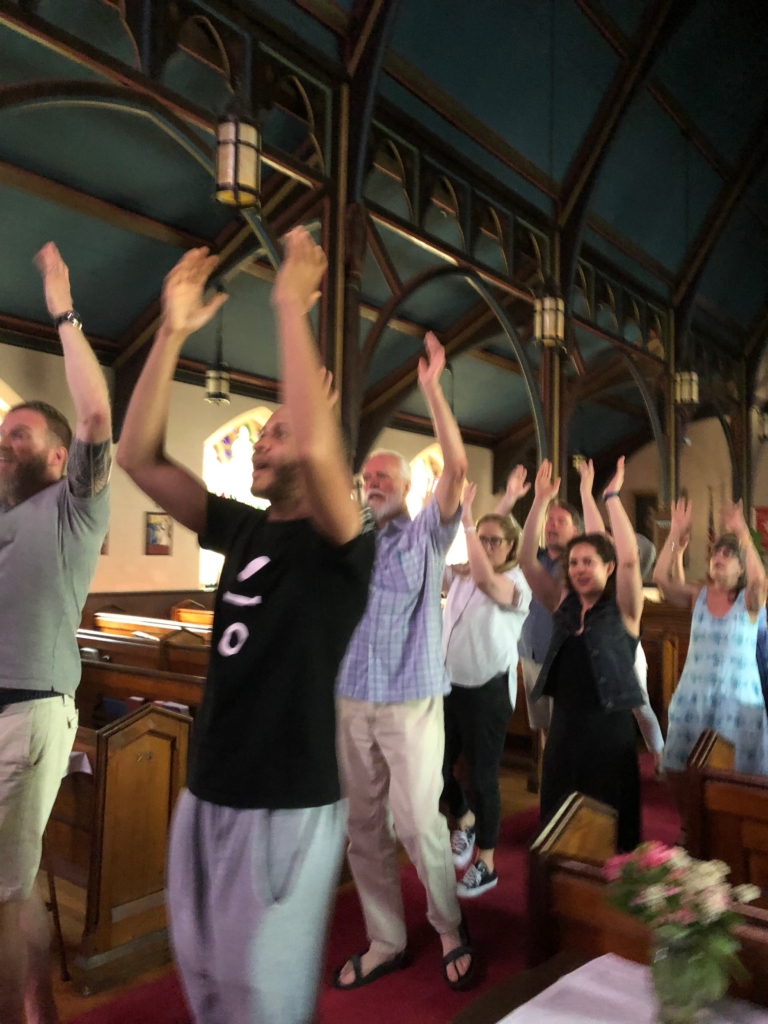


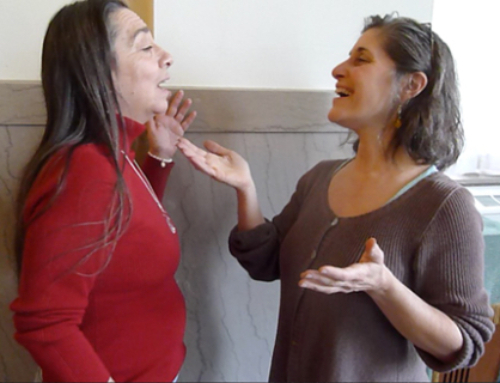
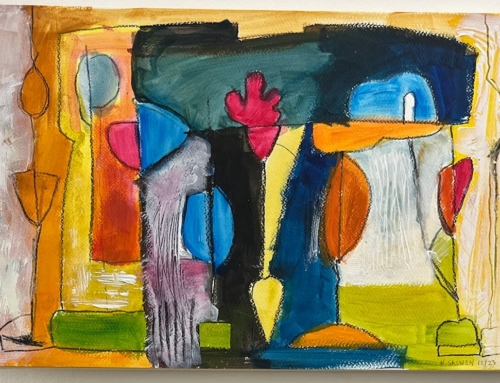

Would love to join need to have hip replacement first !
Can’t wait, excited to learn of your ideas and program.
Thank You – m gabel
Hi Michele — So nice of you to write! Perhaps you’d like to take a Skype lesson or 2 before your hip is healed and you’re ready to come to a workshop — just let me know. When is your surgery?
Looking forward to meeting you! Nancy